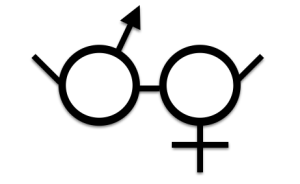
Genderspecs – unpicking gender stereotypes, one blog at a time.
The Gendered Gaze
Come on, you’ve done it too, haven’t you? Described your mate Terry as a ‘man’s man’ or as ‘bloke,’ your mate Fiona as a ‘girly girl.’ These are broad brushstrokes we all recognise. Terry probably likes football, or some sort of sport, while I can bet that the canine following Fiona round the house is not a wolfhound. Gender is a nice simple set of rules we can assign to people. The problem is, it isn’t as simple as that. Not only this, but Terry and Fiona deserve better. We all do.
The most interesting conversation I have with my A Level students happens around the time we start to talk about feminist criticism and literature. I get them to write down ‘male’ and ‘female,’ then get them to think of as many things they associate with each one. What they never fail to do is write down a whole lot of words that are associated with gender, not sex. The problem is, we’ve spent so long assuming that sex (as in, the contents of your pants) and gender are the same thing, the reactions we have to people that move outside of our expectations can provoke deeply uncomfortable, or violent responses. But these are all things that we’ve created.
I cringe at my own female gaze. The times I size up a woman, assessing whether or not I think she can pull off her outfit, if I think someone that age be wearing that length of skirt. It’s some sort of triggered instinct that surges into my brain before I can stamp it down. Changing the way we see each other takes effort. Not because it’s wrong, but because we’ve been trained to think in these simplistic ways from the first time we were swathed in either a ‘Mummy’s Little Monster’ or ‘Daddy’s little Princess’ babygro. But we can do it.
And the view isn’t as rosy on the other side either. As Norah Vincent discovered in her research for the book Self-Made Man, where she lived as a man for eighteen months, entering the privileged land of the patriarchy has its own drawbacks. From pseudo-emotional drinking in a bowling team, to stifled feelings in a monastery, to downright misogyny in the door-to-door salesman trade, she discovered that the magic combination of white and male isn’t so great. It meant scaling back her listening skills, repressing her emotions, not being able to say what she wanted to say. She felt far more restricted in her clothes, too. While assessing the wardrobe is never an easy task, I do think that having the binary option of suit or jeans might get a teensy bit boring. If my other half wanted to chuck on a skirt or a stretchy top that showed off his lovely chest, why should I care?
Recently, I’ve become for more interested in not just those who challenge gender stereotypes, refuse to be coloured by the male or female gaze, but those who actually cross boundaries between the two. I distinctly remember a time on the bus, I was probably eight, and there was someone on the bus whose gender I just couldn’t figure out. And how I stared. Trying to find some hint; stubble, makeup, anything that would allow me to settle into comfortable recognition and go back to thinking about what to buy with my pocket money. Where does this obsession come from? It’s not surprising, really. When I was growing up (old lady alert) the projections of gender I experienced were very rigid, and growing up in the 90s didn’t do much to dissuade that (although thanks to Sarah Cox and Zoe Ball I may have ruined my liver in the quest to ‘be as good as a man’). In every glance, we’re looking to seek comfort from categorising people. If we find people who seem fluid, or are dressed or portraying an image of something other than what we see as their ‘real’ gender, it doesn’t fit with our pigeonholing. And why should it? I’ll be damned if I’m going to wear heels and a skirt every day simply because I have a uterus, so who am I to assign strict rules of visual presentation to others? I can’t imagine how it must feel to not have your body line up with your mental image of yourself. It’s bad enough when you feel like a gorgeous sex bomb (usually about three drinks in) and you catch yourself in the mirror and get a full view of your wrinkles and red eyes in the harsh lights of the pub toilets, but to look in the mirror and not see your true self, that must be dreadful. If altering your dress, your mannerisms, your body, to something you feel more represents you makes you happy, then we should be applauding it, not denigrating it.
So that’s what, in my own way, I’m trying to do. Reaching across the virtual landscape to offer support to anyone who feels stifled or judged by the gendered gaze. Joining my voice with all the others who believe that a person is just that: a person, before they are anything else.
So here’s to the future, to change. To becoming more than visible. Personally, I hope that if I have kids, when they’re on the bus and they see someone who doesn’t fit with their ideas of a fixed gender, they don’t even bat an eyelid.
#TDOV #MoreThanVisibilty
#politics #people #transexual #article #transgender #equality #comment #Genderspecs #representation #gender

0 Comments